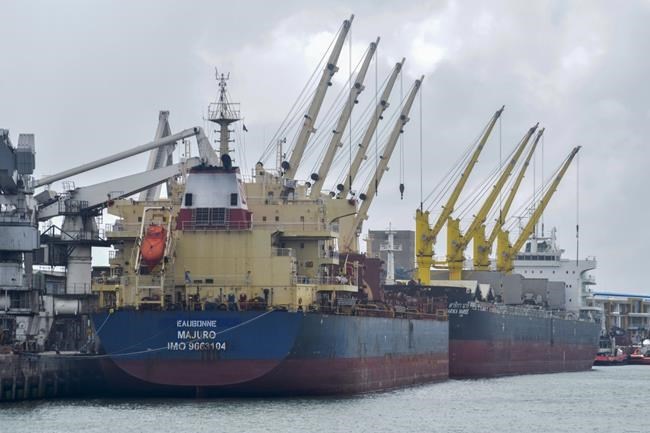KYIV, Ukraine (AP) — An unprecedented wartime deal that allowed grain to flow from Ukraine to countries in Africa, the Middle East and Asia where hunger is a growing threat and high food prices are pushing more people into poverty was extended just before its expiration date, officials said Saturday.
The United Nations and Turkish President Recep Tayyip Erdogan announced the extension, but neither confirmed how long it would last. The U.N., Turkey and Ukraine had pushed for 120 days, while Russia said it was willing to agree to 60 days.
Ukrainian Deputy Prime Minister Oleksandr Kubrakov tweeted Saturday that the deal would remain in effect for the longer, four-month period.
This is the second renewal of separate agreements that Ukraine and Russia signed with the United Nations and Turkey to allow food to leave the Black Sea region after Russia invaded its neighbor more than a year ago.
The warring nations are both major global suppliers of wheat, barley, sunflower oil and other affordable food products that developing nations depend on.
Russia has complained that shipments of its fertilizers — which its deal with Turkey and the U.N. was supposed to facilitate — are not getting to global markets, which has been an issue for Moscow since the agreement first took effect in August. It nonetheless was renewed in November for another four months.
Stéphane Dujarric, a spokesman for U.N. Secretary-General Antonio Guterres, said in a statement that 25 million metric tonnes (about 28 millions tons) of grain and foodstuffs had moved to 45 countries under the initiative, helping to bring down global food prices and stabilizing markets.
“We remain strongly committed to both agreements and we urge all sides to redouble their efforts to implement them fully,” Dujarric said.
The war in Ukraine sent food prices surging to record highs last year and helped contribute to a global food crisis also tied to lingering effects of the COVID-19 pandemic and climate factors like drought.
The disruption in shipments of grain needed for staples of diets in places like Egypt, Lebanon and Nigeria exacerbated economic challenges and helped push millions more people into poverty or food insecurity. People in developing countries spend more of their money on basics like food.
The crisis left an estimated 345 million people facing food insecurity, according to the U.N.’s World Food Program.
Food prices have fallen for 11 straight months, but food was already expensive before the war because of droughts from the Americas to the Middle East — most devastating in the Horn of Africa, with thousands dying in Somalia. Poorer nations that depend on imported food priced in dollars are spending more as their currencies weaken.
The agreements also faced setbacks since it was brokered by the U.N. and Turkey: Russia pulled out briefly in November before rejoining and extending the deal. In the past few months, inspections meant to ensure ships only carry grain and not weapons have slowed down.
That has helped lead to backlogs in vessels waiting in the waters of Turkey and a recent drop in the amount of grain getting out of Ukraine.
Ukrainian and some U.S. officials have blamed Russia for the slowdowns, which the country denies.
While fertilizers have been stuck, Russia has exported huge amounts of wheat after a record crop. Figures from financial data provider Refinitiv showed that Russian wheat exports more than doubled to 3.8 million tons in January from the same month a year ago, before the invasion.
Russian wheat shipments were at or near record highs in November, December and January, increasing 24% over the same three months a year earlier, according to Refinitiv. It estimated Russia would export 44 million tons of wheat in 2022-2023.
___
Andrew Wilks in Istanbul, Elise Morton in London and Julie Walker in New York contributed to this report.
___
See AP’s complete coverage of the war in Ukraine at https://apnews.com/hub/russia-ukraine and the food crisis at https://apnews.com/hub/food-crisis.
Karl Ritter, The Associated Press



